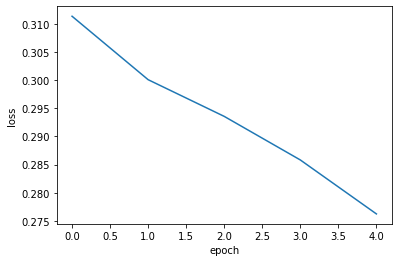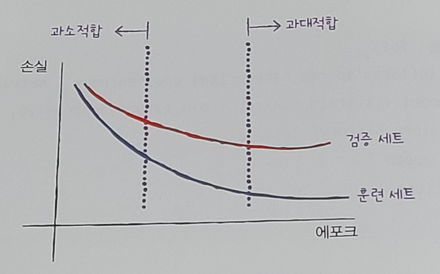신경망 모델 훈련
손실 곡선
- 아래는 fit() 메서드 실행 시, 실행 결과를 자동으로 출력한 것. => History 클래스 객체를 반환

- History 객체에는 훈련 과정에서 계산한 지표, 즉 손실과 정확도 값이 저장.
- 이 값을 사용하면, 그래프를 그릴 수 있다.
함수를 이용하여 layer 구성
In [1]:
import tensorflow as tf
from tensorflow import keras
from tensorflow import keras
(train_input, train_target), (test_input, test_target) =\
keras.datasets.fashion_mnist.load_data()
from sklearn.model_selection import train_test_split
train_scaled = train_input/255.0
train_scaled, val_scaled, train_target, val_target = train_test_split(train_scaled, train_target, test_size=0.2, random_state=42)
def model_fn(a_layer=None):
model = keras.Sequential()
model.add(keras.layers.Flatten(input_shape=(28, 28)))
model.add(keras.layers.Dense(100, activation='relu', name='hidden'))
if a_layer:
model.add(a_layer)
model.add(keras.layers.Dense(10, activation='softmax', name='output'))
return model
In [2]:
model = model_fn()
model.summary()
Model: "sequential"
_________________________________________________________________
Layer (type) Output Shape Param #
=================================================================
flatten (Flatten) (None, 784) 0
hidden (Dense) (None, 100) 78500
output (Dense) (None, 10) 1010
=================================================================
Total params: 79,510
Trainable params: 79,510
Non-trainable params: 0
_________________________________________________________________
In [4]:
model.compile(loss='sparse_categorical_crossentropy', metrics='accuracy')
## verbose = 0 => 에포크마다 진행 막대와 함께 손실 등의 지표가 출력
## 2일 경우, 진행막대를 빼고 출력
## 0일 경우, 훈련과정을 나타내지 않음
## 1일 경우, 기본값.
history = model.fit(train_scaled, train_target, epochs=5, verbose=0)
history객체에는 훈련 측정값이 담겨 있는 history딕셔너리가 들어있음.
In [5]:
print(history.history.keys())
dict_keys(['loss', 'accuracy'])
history 속성에 포함된 손실과 정확도는 에포크마다 계산한 값이 순서대로 나열된 단순한 리스트
- 맷플롯립을 사용해 그래프로 추출 가능
In [7]:
import matplotlib.pyplot as plt
plt.plot(history.history['loss'])
plt.xlabel('epoch')
plt.ylabel('loss')
plt.show()

In [8]:
plt.plot(history.history['accuracy'])
plt.xlabel('epoch')
plt.ylabel('accuracy')
plt.show()

확실히 에포크마다 손실이 감소하고 정확도가 향상
에포크를 늘려서 더 훈련해 볼 경우, 어떠한 지 확인
In [14]:
model = model_fn()
model.compile(loss='sparse_categorical_crossentropy', metrics='accuracy')
history = model.fit(train_scaled, train_target, epochs=20, verbose=0)
plt.plot(history.history['loss'])
plt.xlabel('epoch')
plt.ylabel('loss')
plt.show()


예상대로 손실이 잘 감소하지만, 과대적합(overfitting)이 발생하여 새로운 데이터에 대해서는 문제 발생.
인공 신경망 모델이 최적화하는 대상은 정확도가 아니라 손실함수이다.
In [15]:
model = model_fn()
model.compile(loss='sparse_categorical_crossentropy', metrics='accuracy')
history = model.fit(train_scaled, train_target, epochs=20, verbose=0, validation_data=(val_scaled, val_target))
반환된 history.history 딕셔너리에 어떤 값이 있는 지 확인.
In [12]:
print(history.history.keys())
dict_keys(['loss', 'accuracy', 'val_loss', 'val_accuracy'])
과대/과소적합 문제를 조사하기 위해 훈련 손실과 검증 손실 그래프 확인
In [16]:
plt.plot(history.history['loss'])
plt.plot(history.history['val_loss'])
plt.xlabel('epoch')
plt.ylabel('loss')
plt.legend(['train', 'val'])
plt.show()

investigation
- val 손실 곡선이 4번째 에포크에서 다시 상승.
- train은 꾸분히 감소하기에 전형적인 과대적합 모델이 생성.
- 과대적합을 막기 위해, 신경망 규제 방법이 필요함.
- 혹은, 옵티마이저 하이퍼파라미터를 조정하여 과대적합을 완화 가능.
In [17]:
model = model_fn()
model.compile(optimizer='adam', loss='sparse_categorical_crossentropy', metrics='accuracy')
history = model.fit(train_scaled, train_target, epochs=20, verbose=0, validation_data=(val_scaled, val_target))
plt.plot(history.history['loss'])
plt.plot(history.history['val_loss'])
plt.xlabel('epoch')
plt.ylabel('loss')
plt.legend(['train', 'val'])
plt.show()

Result
- 과대적합이 휠씬 감소
- 검증 손실 그래프가 9번째 에포크까지 전반적인 감소 추세가 유지
- [adam] 옵티마이저가 이 데이터셋에 잘 맞는다.
- 학습률을 조정해서 다시 시도 가능.
'책[이해 및 학습]' 카테고리의 다른 글
| 9. [혼자 공부하는 머신러닝/딥러닝] 모델 저장과 복원 (0) | 2024.03.09 |
|---|---|
| 8. [혼자 공부하는 머신러닝/딥러닝] 드롭아웃 (0) | 2024.03.09 |
| 6. [혼자 공부하는 머신러닝/딥러닝] 옵티마이저 (0) | 2024.03.09 |
| 5. [혼자 공부하는 머신러닝/딥러닝] 렐루함수 & Flatten layer (0) | 2024.03.09 |
| 4. [혼자 공부하는 머신러닝/딥러닝] 층을 추가하는 방법(add 메서드) (0) | 2024.03.09 |



